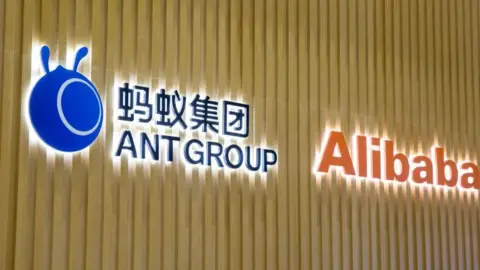China’s tech giants face new anti-monopoly rules
 Getty Images
Getty ImagesNew anti-monopoly rules for China's tech giants were introduced on Sunday.
The guidelines, which formalise draft laws released in November, come as regulators try to crack down on anti-competitive behaviour.
The rules are aimed at stopping China’s e-commerce giants Alibaba and JD.com from abusing their dominant market position.
Specifically, the rules stop e-commerce platforms from forcing vendors to deal exclusively with them.
China’s State Administration for Market Regulation (SAMR) wants to stop price-fixing, predatory pricing and unreasonable trading conditions.
There are also rules against restricting technologies and using data and algorithms to manipulate the market.
The guidelines will also apply to financial technology and payments companies such as Tencent’s WeChat Pay and Ant Group, Alibaba’s payments affiliate.
SAMR said reports of anti-competitive behaviour had been increasing, and that it was facing challenges regulating the industry.
“The behaviour is more concealed, the use of data, algorithms, platform rules and so on make it more difficult to discover and determine what are monopoly agreements,” SAMR said.
Tougher approach
The new rules come into effect as China takes a firmer line against alleged anti-competitive behaviour.
On Monday, SAMR announced it had fined online discount retailer Vipshop nearly $500,000 (£364,000) for unfair competition.
Between August and December last year, the retailer had developed a system to obtain information on brands it and competitors sold, which gave it an advantage.
The regulator said Vipshop used its system to influence user choices and transaction opportunities and to block sales of particular brands.
SAMR is also currently carrying out an antitrust investigation into Alibaba, which it first announced in December.
The investigation followed Ant Group’s decision to drop a planned $37bn share market launch after regulators intervened.
